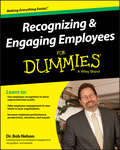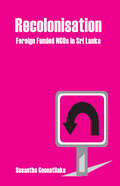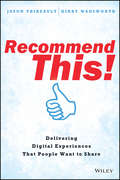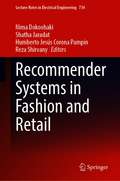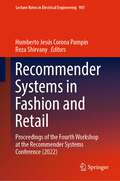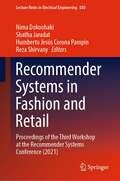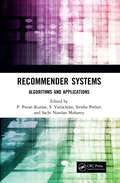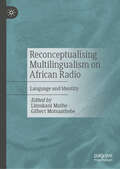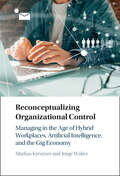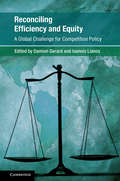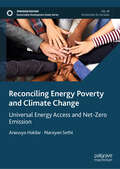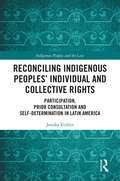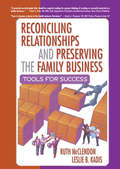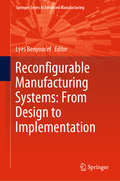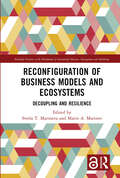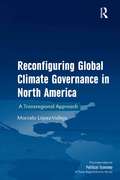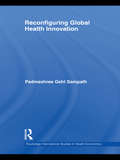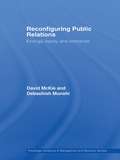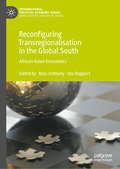- Table View
- List View
Recognizing Revenues and Expenses: Realized and Earned
by Robert S. KaplanDescribes a key concept in financial accounting: choosing an appropriate revenue recognition point. The accrual process requires revenue recognition and expense matching for reporting on the value creation process of companies. Describes the two key criteria for revenue recognition--realized and earned--and the conditions that must be met to satisfy these criteria. The use of the typical recognition point, when the product or service is delivered to the customer, is discussed as well as situations (e.g., the percentage of competition method) when revenue can be recognized before actual delivery. A rewritten version of an earlier note.
Recognizing Revenues and Expenses: Realized and Earned
by Robert S. KaplanDescribes a key concept in financial accounting: choosing an appropriate revenue recognition point. The accrual process requires revenue recognition and expense matching for reporting on the value creation process of companies. Describes the two key criteria for revenue recognition--realized and earned--and the conditions that must be met to satisfy these criteria. The use of the typical recognition point, when the product or service is delivered to the customer, is discussed as well as situations (e.g., the percentage of competition method) when revenue can be recognized before actual delivery. A rewritten version of an earlier note.
Recognizing and Engaging Employees For Dummies
by Bob Nelsoning factor. When your employees feel appreciated, they stick around, work harder, achieve more, and drive your business onward and upward. This book shows you how to bring that dynamic to your workplace, with step-by-step guidance and helpful advice.Design successful recognition programsCreate powerful incentives for employeesReduce turnover, improve engagement, and drive excellenceFoster a happier and more productive workplaceHappy employees are productive employees. They get results. They innovate. They are the force behind the advancement of industries. Effective employee recognition programs are self-sustaining motivational tools that keep the fire lit. If you're ready to spark the flame, Recognizing and Engaging Employees for Dummies is the ideal guide for designing, implementing, and maintaining the program your employees have been waiting for.
Recolonisation: Foreign Funded NGOs in Sri Lanka
by Susantha GoonatilakeAs the Cold War ended there was a conscious policy shift in Western countries—and, as a consequence, among international agencies—which was directed at supporting non-governmental organizations (NGOs) in the developing world. As a result, large amounts of foreign funds began to be granted to various NGO groups with the ostensible aim of encouraging pro-people development. This book contributes to the emerging debate which is questioning the role of foreign funded NGOs. There is a growing awareness that they often have a powerful and structural influence, impacting on both organisational landscapes and civil society. In this context, Susantha Goonatilake studies the political economy of NGO activity in Sri Lanka, a country which once had a vibrant democratic tradition and a functioning civil society. The author maintains that focused NGO penetration into the country began in the 1980s, simultaneously with the growth of the authoritarian state. He contends that their subsequent activities in Sri Lanka have had a deep and visible impact on civic life: from restructuring the state, to de-mobilising the armed forces, to privatising foreign relations, to controlling key segments of academia and media. To illustrate his argument he takes up four areas—social development, human rights, international relations and academia—and describes the role of foreign funded NGOs in all four. Through these case studies the author highlights his basic premise: that the work of foreign funded NGOs actually undermines local civil institutions and that they project an implicit agenda for re-colonisation.. Constituting the first detailed case study of what is happening on the ground, this absorbing book challenges the widely held view of foreign funded NGOs being unsullied harbingers of good.
Recommend This!
by Kirby Wadsworth Jason ThibeaultImproving engagement with digital audiences is fast becoming a boardroom topic for many organizations. Digital marketers and communicators seeking to harness this newfound power are finding challenges in engaging digital audiences due to short attention spans, noisy channels, and rapidly changing consumer expectations. Recommend This! is an exploration into the digital consumer, and how their expectations are forcing marketers to re-think the way they interact and engage with audiences. Key topics discussed in the book are:Physical or digital, as humans we are driving to connect. Digital just makes it easier.Storytelling, rather than broadcast messaging, helps marketers engage with their digital audiences.Digital content must be personalized and relevant to receive attention, and more.
Recommender Systems in Fashion and Retail (Lecture Notes in Electrical Engineering #734)
by Nima Dokoohaki Shatha Jaradat Humberto Jesús Corona Pampín Reza ShirvanyThis book includes the proceedings of the second workshop on recommender systems in fashion and retail (2020), and it aims to present a state-of-the-art view of the advancements within the field of recommendation systems with focused application to e-commerce, retail, and fashion by presenting readers with chapters covering contributions from academic as well as industrial researchers active within this emerging new field. Recommender systems are often used to solve different complex problems in this scenario, such as product recommendations, or size and fit recommendations, and social media-influenced recommendations (outfits worn by influencers).
Recommender Systems in Fashion and Retail: Proceedings of the Fourth Workshop at the Recommender Systems Conference (2022) (Lecture Notes in Electrical Engineering #981)
by Humberto Jesús Corona Pampín Reza ShirvanyThis book includes the proceedings of the fourth workshop on recommender systems in fashion and retail (2022), and it aims to present a state-of-the-art view of the advancements within the field of recommendation systems with focused application to e-commerce, retail, and fashion by presenting readers with chapters covering contributions from academic as well as industrial researchers active within this emerging new field. Recommender systems are often used to solve different complex problems in this scenario, such as product recommendations, size and fit recommendations, and social media-influenced recommendations (outfits worn by influencers).
Recommender Systems in Fashion and Retail: Proceedings of the Third Workshop at the Recommender Systems Conference (2021) (Lecture Notes in Electrical Engineering #830)
by Nima Dokoohaki Shatha Jaradat Humberto Jesús Corona Pampín Reza ShirvanyThis book includes the proceedings of the third workshop on recommender systems in fashion and retail (2021), and it aims to present a state-of-the-art view of the advancements within the field of recommendation systems with focused application to e-commerce, retail, and fashion by presenting readers with chapters covering contributions from academic as well as industrial researchers active within this emerging new field. Recommender systems are often used to solve different complex problems in this scenario, such as product recommendations, size and fit recommendations, and social media-influenced recommendations (outfits worn by influencers).
Recommender Systems: Algorithms and Applications
by Sachi Nandan Mohanty P. Pavan Kumar S. Vairachilai Sirisha PotluriRecommender systems use information filtering to predict user preferences. They are becoming a vital part of e-business and are used in a wide variety of industries, ranging from entertainment and social networking to information technology, tourism, education, agriculture, healthcare, manufacturing, and retail. Recommender Systems: Algorithms and Applications dives into the theoretical underpinnings of these systems and looks at how this theory is applied and implemented in actual systems. The book examines several classes of recommendation algorithms, including Machine learning algorithms Community detection algorithms Filtering algorithms Various efficient and robust product recommender systems using machine learning algorithms are helpful in filtering and exploring unseen data by users for better prediction and extrapolation of decisions. These are providing a wider range of solutions to such challenges as imbalanced data set problems, cold-start problems, and long tail problems. This book also looks at fundamental ontological positions that form the foundations of recommender systems and explain why certain recommendations are predicted over others. Techniques and approaches for developing recommender systems are also investigated. These can help with implementing algorithms as systems and include A latent-factor technique for model-based filtering systems Collaborative filtering approaches Content-based approaches Finally, this book examines actual systems for social networking, recommending consumer products, and predicting risk in software engineering projects.
Reconceiving the Challenge of Change--The Importance of Individual Development
by Lisa Laskow Lahey Robert KeganIn the complex and ever-changing world we live in, human capability will be the critical variable in the new century. But leaders who seek to win a war for talent by conceiving of capability as a fixed resource to be found "out there" put themselves and their organizations at a serious disadvantage. Your ability to develop yourself, your people, and your teams, on the other hand, will distinguish your leadership ability. This chapter introduces a body of research on the development of mental complexity in adulthood, which has major implications for increasing personal as well as organizational adaptability. This chapter is excerpted from "Immunity to Change: How to Overcome It and Unlock the Potential In Yourself and Your Organization."
Reconceptualising Global Finance and Its Regulation
by Ross P. Buckley Emilios Avgouleas Buckley, Ross P. and Avgouleas, Emilios and Arner, Douglas W. Douglas W. ArnerThe current global financial system may not withstand the next global financial crisis. In order to promote the resilience and stability of our global financial system against future shocks and crises, a fundamental reconceptualisation of financial regulation is necessary. This reconceptualisation must begin with a deep understanding of how today's financial markets, regulatory initiatives and laws operate and interact at the global level. This book undertakes a comprehensive analysis of such diverse areas as regulation of financial stability, modes of supply of financial services, market infrastructure, fractional reserve banking, modes of production of global regulatory standards and of the pressing need to reform financial sector ethics and culture. Based on this analysis, Reconceptualising Global Finance and its Regulation proposes realistic reform initiatives, which will be of primary interest to regulatory and banking legal practitioners, policy makers, scholars, research students and think tanks.
Reconceptualising Multilingualism on African Radio: Language and Identity
by Gilbert Motsaathebe Limukani MatheThis book redefines multilingualism via the concept of radio in Africa. Africa presents unique challenges of lingual diversity which the media still struggles to accommodate, particularly when it comes to indigenous languages. Contributors argue that the linguistic realities of African radio reflect ethnic co-existence and fluidity of identity in pre-colonial, colonial and post-colonial contexts. They argue that communities consist of several “majorized” and “minoritized” indigenous languages which, if closely analysed, reflect a commonality of multilingualism. The book also suggests practical measures through which linguistic co-existence could be achieved and explores cases that redefine, reconceptualize and reframe multilingualism on African radio.
Reconceptualizing Organizational Control: Managing in the Age of Hybrid Workplaces, Artificial Intelligence, and the Gig Economy
by Markus Kreutzer Jorge WalterOrganizational control addresses the fundamental yet vexing managerial problem of aligning workers' capabilities, activities, and performance with organizational goals and aspirations. In recent years, the onset of COVID-19, combined with new developments in information and communication technologies, has brought about profound changes in organizations, and even in the nature of work itself. We have seen surges in virtual and remote work; progression of alternative work arrangements (especially in the gig economy); and an increasingly wide-spread reliance on algorithmic monitoring and control. These changes have exacerbated the tension between the pursuit of individual and organizational interests, exposing the limits of traditional approaches to organizational control, and questioning whether they still reflect contemporary organizational realities. Providing a comprehensive discussion of the multi-disciplinary approaches to organizational control, this book integrates the new and evolving trends in technology, organizations, and society into a reconceptualization of organizational control for twenty-first-century organizations.
Reconciling Efficiency and Equity: A Global Challenge for Competition Policy (Global Competition Law and Economics Policy)
by Ioannis Lianos Damien GerardDue to the growing influence of economics and economists in competition law and policy discourse and the internationalization of antitrust, the equity versus efficiency trade-off debate has played a defining role in the transformation of the dominant paradigm governing competition law enforcement since at least the 1970s. The debate remains crucial today as issues of economic inequality and its interaction with efficiency become of central concern to policy and decision-makers in competition law, as well as in other spheres of public policy. Despite their central role in the grammar of competition law on the global plane, the intellectual underpinnings of the interactions between 'equity' and 'efficiency' in the context of competition law have never been examined in-depth. This book aims precisely to fill this gap by discussing new approaches in understanding the role of efficiency and equity concerns in competition law.
Reconciling Energy Poverty and Climate Change: Universal Energy Access and Net-Zero Emission (Sustainable Development Goals Series)
by Anasuya Haldar Narayan SethiThis book highlights innovative solutions that not only combat climate change but also address energy poverty, ensuring a more sustainable and equitable future. It explores common roots, synergies, and trade-offs between energy poverty and climate change. It argues that policies to combat climate change like decarbonization, can negatively impact energy poverty alleviation, whereas policies to reduce energy poverty like increasing energy access, reduction in energy prices, or rise in energy demand, may increase energy-related carbon emission that contributes to climate change.This book meticulously delves into the challenges of providing clean, reliable, and modern energy access to millions of energy-poor people, without creating any negative impact on the environment. It not only provides a comprehensive review of the intricacies of energy poverty and climate change mitigation but also gives a clear understanding of the policy challenges encountered to address the dual problem. Moreover, given the sustainable development goals of attaining SDG7 by 2030 and SDG13 by 2050, the content is timely and significant. Apart from students, this book will be beneficial to academics, working as development economists or energy economists, government policymakers, media personnel covering the climate crisis, and social activists.
Reconciling Expectations: The Unexpected Challenges of Transitioning from Individual Contributor to Manager
by Linda A. HillWhen a new manager steps into their role, initial expectations about the job and the tasks associated with managing fall quickly by the wayside. Most new managers must go through a period of unlearning what it means to be an individual contributor before they can fully step into the role of manager. Author Linda A. Hill followed nineteen new managers through their first year, gathering data about the managerial transition. In this chapter, she focuses on their experiences in the first six months, reconciling their expectations of power and control with the realities of day-to-day managerial work and the expectations of their subordinates. This chapter was originally published as Chapter 2 of "Becoming a Manager: How New Managers Master the Challenges of Leadership."
Reconciling Indigenous Peoples’ Individual and Collective Rights: Participation, Prior Consultation and Self-Determination in Latin America (Indigenous Peoples and the Law)
by Jessika EichlerThis book critically assesses categorical divisions between indigenous individual and collective rights regimes embedded in the foundations of international human rights law. Both conceptual ambiguities and practice-related difficulties arising in vernacularisation processes point to the need of deeper reflection. Internal power struggles, vulnerabilities and intra-group inequalities go unnoticed in that context, leaving persisting forms of neo-colonialism, neo-liberalism and patriarchalism largely untouched. This is to the detriment of groups within indigenous communities such as women, the elderly or young people, alongside intergenerational rights representing considerable intersectional claims and agendas. Integrating legal theoretical, political, socio-legal and anthropological perspectives, this book disentangles indigenous rights frameworks in the particular case of peremptory norms whenever these reflect both individual and collective rights dimensions. Further-reaching conclusions are drawn for groups ‘in between’, different formations of minority groups demanding rights on their own terms. Particular absolute norms provide insights into such interplay transcending individual and collective frameworks. As one of the founding constitutive elements of indigenous collective frameworks, indigenous peoples’ right to prior consultation exemplifies what we could describe as exerting a cumulative, spill-over and transcending effect. Related debates concerning participation and self-determination thereby gain salience in a complex web of players and interests at stake. Self-determination thereby assumes yet another dimension, namely as an umbrella tool of resistance enabling indigenous cosmovisions to materialise in the light of persisting patterns of epistemological oppression. Using a theoretical approach to close the supposed gap between indigenous rights frameworks informed by empirical insights from Bolivia, the Andes and Latin America, the book sheds light on developments in the African and European human rights systems.
Reconciling Relationships and Preserving the Family Business: Tools for Success
by Ruth Mcclendon Leslie B KadisLearn how to keep family problems from affecting the family business! Reconciling Relationships and Preserving the Family Business: Tools for Success presents a comprehensive model for reconciling fractured relationships within the business-owning family. Studies show that more than two-thirds of family-owned businesses don't survive past the first generation-and more than 90 percent of all business enterprises in the United States are owned by families. Written by the founders of the Carmel Institute for Family Business, this unique book is an essential tool for people involved in family businesses, where personal issues can mix with financial interdependencies and work grievances to cause professional failures independent of bad management, market conditions, or financial constraints. Reconciling Relationships and Preserving the Family Business is a practical and concise guide to building healthy families and collaborative family business teams that last for generations. The book introduces the ideology that frames the Reconciliation Model for relationship repair, and defines two main systemic problems facing business-owning families: oppression and disengagement. It also presents an in-depth study of a business-owning family, demonstrating how the Reconciliation Model works-step-by-step. Reconciling Relationships and Preserving the Family Business addresses, including: basic principles of relationships in business-owning families individual dynamics that account for human dilemmas power issues effective intervention in troubled relationships assessing relationship patterns family structure and process roles, responsibilities, and ethics of advisors working with family-owned businesses and much more! Reconciling Relationships and Preserving the Family Business is a vital resource for members of business-owning families and for the professional people who advise them: lawyers, therapists, bankers, clinical social workers, accountants, consultants, and therapists. The book is invaluable for teaching you to recognize real or potential relational problems that can have an adverse effect on the family business.
Reconfigurable Manufacturing Systems: From Design to Implementation (Springer Series in Advanced Manufacturing)
by Lyes BenyoucefThis book develops innovative techniques from operational research and management science for the design and implementation of a reconfigurable manufacturing system (RMS), and subsequently analyzes and assesses their performance. A reconfigurable manufacturing system (RMS) is a paradigm that can address many of the challenges posed by the modern market. Accordingly, substantial research is now being conducted on RMS, focusing on various levels of decision-making (strategic, tactical and operational). However, as a relatively new research area, there are still only very few books and articles available on reconfigurable manufacturing system design and management. In addition to filling that gap, this book provides a forum for investigating, exchanging ideas on, and disseminating the latest advances in the broad area of RMS applications in today’s industry. Gathering contributions by experts from academia, industry and policy-making, it represents an essential contribution to the existing literature on manufacturing and logistics in general and industry 4.0 in particular.
Reconfiguration of Business Models and Ecosystems: Decoupling and Resilience (Routledge Frontiers in the Development of International Business, Management and Marketing)
by Marin A. Marinov Svetla T. MarinovaDecoupling of business models and ecosystems is the disconnection of certain characteristic activities originally planned and completed in coincidence. It could bring in an immense adverse shock in the functioning of established business models and ecosystems possibly bringing them to resilience. Core causes for decoupling and resilience of business models and ecosystems are jolts, known as global crisis, universal pandemics, etc. The undesirable outcomes of critical events can reveal unique circumstances for business model and ecosystem resilience. Business model and ecosystem resilience represents a mandatory prerequisite for firms challenging their functioning and even very existence. Research has been conducted thus far, nevertheless this theme requires significantly more consideration. The key objective of this book is to bring further insights in the field delivering a thorough examination of the ways in which business models and ecosystems can develop resilience under extraordinary conditions. In the book, the resilience of business models and ecosystems is analysed aiming to investigate further the specifics of the relevant processes securing resilience and its outcomes. The resilience of business models and ecosystems is scrutinised as a credible way for enhancing the predispositions of firm’s survivability.
Reconfiguring Families in Contemporary Vietnam
by Danièle Bélanger Magali BarbieriReconfiguring Families in Contemporary Vietnamchronicles and analyzes the most significant change for families in Vietnam's recent past - the transition to a market economy, referred to asDoi Moiin Vietnamese and generally translated as the "renovation". Two decades have passed since the wide-ranging institutional transformations that took place reconfigured the ways families produce and reproduce. The downsizing of the socialist welfare system and the return of the household as the unit of production and consumption redefined the boundaries between the public and private. This volume is the first to offer a multidisciplinary perspective that sets its gaze exclusively on processes at work in the everyday lives of families, and on the implications for gender and intergenerational relations. By focusing on families, this book shifts the spotlight from macro transformations of the renovation era, orchestrated by those in power, to micro-level transformations, experienced daily in households between husbands and wives, parents and children, grandparents and other family members.
Reconfiguring Global Climate Governance in North America: A Transregional Approach (The International Political Economy of New Regionalisms Series)
by Marcela Lopez-VallejoGlobal climate governance has presented problems that have led to failures, yet it has also opened the door to new transregional governance schemes, especially in North America. This book introduces an environmental dimension into the concept of governance. Almost fifteen years after the climate global governance concept emerged, results worldwide have not been as favorable as expected. This book details previous discussions about the concept of global climate governance and its limits. It highlights how the Kyoto Protocol has a limited design taking into account a national approach to global, regional, and transnational problems, had no obligatory mechanisms for implementation and explains the emergence of new polluters not committed under it such as China and India. Furthermore this book explores other levels of authority such as regional institutions - the North American agreement on trade (NAFTA) and on environment (NAAEC), as well as the regional energy working group (NAEWG). The author puts forward a theoretical proposal for re-territorialization and coordination of policies for climate change into new forms of articulating interests in what she terms transnational green economic regions (TGERs) and tests this on two case studies - the Regional Greenhouse Gas Initiative (RGGI) and the Western Climate Initiative (WCI). This study presents the challenges and opportunities of a transregional approach in North America.
Reconfiguring Global Health Innovation (Routledge International Studies In Health Economics Ser. #7)
by Padmashree Gehl SampathReconfiguring Global Health Innovation presents the findings of multi-year research, contrasting experiences of different latecomer countries in building health innovation systems to cater to local needs. It analyses the emerging industrial structures in health innovation as more and more latecomer countries are foraying into what is a highly difficult and technologically intensive sector, with the aim of finding ways and means to balance these promising developments with public health needs worldwide. The bookpresents empirical findings from six countries across Asia and Africa on health innovation, namely, India, Bangladesh, Vietnam, Kenya, Tanzania and Nigeria. The book concludes that the growth of knowledge and the accumulation of capabilities influence the ability of a country to generate wealth.
Reconfiguring Public Relations: Ecology, Equity and Enterprise (Routledge Advances In Management And Business Studies)
by David McKie Debashish MunshiInnovative and timely, this PR book is the first to address environmental questions within the context of global business. An excellent counterpoint to the existing US-oriented literature on this topic, here the authors set out ways to equip public relations to respond to and re-imagine itself in the light of current major forecasts and trends for
Reconfiguring Transregionalisation in the Global South: African-Asian Encounters (International Political Economy Series)
by Ross Anthony Uta RuppertThis volume examines the Africa-Asia relationship from a transregional perspective, namely as a set of emergent social, political and economic practices spanning a number of analytical and spatial scales. Drawing on a host of countries from both regions, the contributions illustrate how encounters increasingly transcend fixed territorial categories at local, national and regional levels. While large-scale political and economic considerations tend to dominate in Asia-Africa related literature—for instance, in China-Africa, BRICS and South-South discourses—the current volume seeks to foster dialogue between these broader levels of analyses and more localized social practices and experiences, including the role of civil society, cultural production and migration. With an emphasis on the “trans” aspects of inter-regional exchange, the volume contributes to a better understanding of new forms of space-making between these two increasingly important regions.

